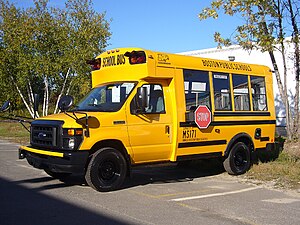 Image via Wikipedia
Image via WikipediaA. The Requirement of FAPE (free and appropriate public education)
The basic requirement of the IDEA is that states and school districts must have in effect policies and procedures that ensure that children with a disability receive a free and appropriate public education, hereafter sometimes referred to as “FAPE.” IDEA, § 612(a)(1).
The IDEA defines “child with a disability” as a child:
(i)with mental retardation, hearing impairments…, speech or language impairments, visual impairments…, serious emotional disturbance, orthopedic impairments, autism, traumatic brain injury, other health impairments, or specific learning disabilities; and
(ii)who by reason thereof, needs special education and related services.
IDEA, § 602(3)
The IDEA defines “FAPE” as:
special education and related services that:
(A) have been provided at public expense, under public supervision and direction, and without charge;
(B) meet the standards of the State educational agency;
(C) include an appropriate preschool, elementary school or secondary school education in the state involved; and
(D) are provided in conformity with the individualized education program required (…hereunder.).
IDEA, § 602(9). See also 34 C.F.R. §§ 300.101 to 300.113.
The IDEA defines “special education” as:
Specially designed instruction, at no cost to the parents, to meet the unique needs of a child with a disability, including
(A) instruction conducted in the classroom, in the home, in hospitals and institutions, and in other settings; and
(B) instruction in physical education.
IDEA, § 602(29).
The Supreme Court of the United States issued the seminal decision interpreting the provisions of the IDEA in the case of Board of Education of Hendrick Hudson Bd. of Ed. v. Rowley 455 U.S. 175, 102 S.Ct. 3034, 553 IDELR 656 (1982). The facts of the case were that the student had a hearing impairment. The parents requested that the schools provide a sign language interpreter for all of the student’s academic classes. Although the child was performing better than the average child in her class and easily advancing from grade to grade, she was not performing consistent with her academic potential. Rowley, supra, 102 S.Ct at 3039-3040.
Holding that FAPE required a potential maximizing standard, the District Court ruled in favor of the student. The U. S. Court of Appeals for the Second Circuit affirmed. See, Rowley, 102 S.Ct. at 3040.
The Supreme Court reversed. Rowley, supra, 102 S.Ct at 3052. After a review of the legislative history of the Act and the cases leading to Congressional passage of the Act, the Supreme Court held that the Congress did not intend to impose a potential-maximizing standard, but rather, intended to open the door of education to disabled students by requiring a basic floor of opportunity. Rowley, supra, 102 S.Ct at 3043-3051.
The Supreme Court noted that the individualized Educational Program, hereafter sometimes referred to as the “IEP,” is the cornerstone of the Act’s requirement of FAPE. Rowley, supra, 102 S.Ct at 3038, 3049. The Court also notes with approval the many procedural safeguards imposed upon the schools by the Act. Rowley, supra, 102 S.Ct at 3050-3051. The Court also cautioned the lower courts that they are not to substitute their “…own notions of sound educational policy for those of the school authorities which they review.” Rowley, supra, 102 S.Ct at 3051.
The Supreme Court held that instead of requiring a potential maximizing standard, FAPE is satisfied where the education is sufficient to confer some educational benefit to the student with a disability. Rowley, supra, 102 S.Ct at 3048. Accordingly, the Court concludes that the IDEA requires “…access to specialized instruction and related services which are individually designed to provide educational benefit to the …” child with a disability. Rowley, supra, 102 S.Ct at 3048.
The Supreme Court instructed lower courts that the inquiry in cases alleging denial of FAPE should be twofold: First, have the schools “…complied with the procedures set forth in the Act? And second, is the individualized educational program developed through the Act’s procedures reasonably calculated to enable the child to receive educational benefits.” Rowley, supra, 102 S.Ct. at 3051.

